This year's Nobel Prize in Physiology or Medicine was awarded to a pair of researchers who paved the way for the development of a COVID-19 vaccine using genetic material called messenger ribonucleic acid (mRNA). The laureates are Dr. Katalin Karikó (68), an advisor to the German biotech company BioNTech and a visiting professor at the University of Pennsylvania in the USA, and Dr. Drew Weissman (64), a professor at the same university. In a press conference on October 2, the Karolinska Institutet in Sweden highly praised the research achievements of the two scientists, stating, "13 billion doses of the vaccine were administered worldwide, and this saved the lives of millions of people, allowing for society to return to normal."
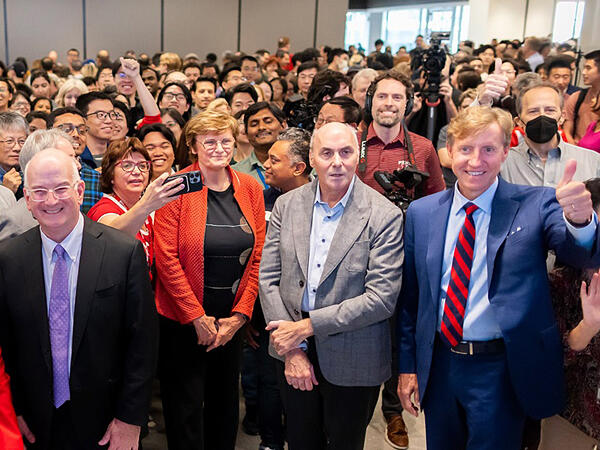
Provided by the University of Pennsylvania
Dr. Karikó and her colleagues developed a technology that allows mRNA to enter the body without triggering an inflammatory response. They achieved this by replacing certain substances that make up mRNA. Based on this technology, BioNTech collaborated with the US pharmaceutical giant Pfizer to develop a COVID-19 vaccine, and US-based Moderna also developed a vaccine with a similar mechanism. At the end of 2020, less than a year from the start of development, the vaccine was put into practical use and has been widely used in various countries worldwide.
Dr. Karikó was born in Hungary during the Cold War and learned molecular biology while living a modest life. After struggling to immigrate to the USA, she met Dr. Weissman, and they continued their research together. Karikó was asleep early in the morning when she received the call from the Nobel Foundation. She later attended a press conference at the University of Pennsylvania and encouraged female students to follow in her footsteps.
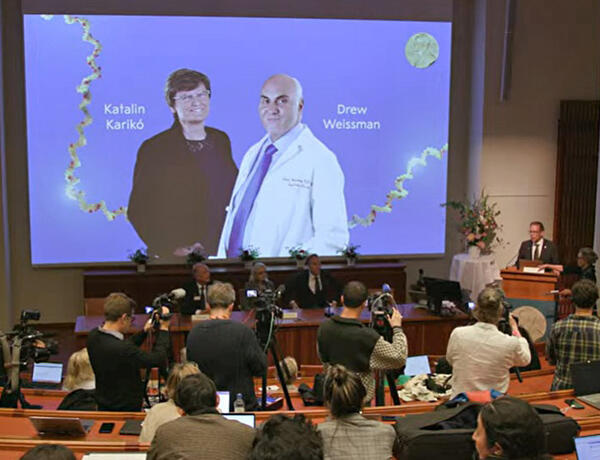
From a video showing the Nobel Foundation press conference provided by the Nobel Foundation
The two researcher's technology allows for practical use of the vaccine in less than a year
The novel coronavirus was first discovered in Wuhan, China, in December 2019. In Japan, the first infected person was confirmed in mid-January 2020, after the new year. The disease quickly spread to various European countries, the USA, and Asia. Meanwhile, the viral genome sequence was disclosed to the public shortly after the first confirmation of infection. Less than a year afterward, BioNTech and Pfizer developed mRNA vaccines. In December of the same year, vaccination with the Pfizer−BioNTech vaccine started in the UK, and the vaccine was quickly disseminated worldwide. Vaccination with the Moderna vaccine followed.
Vaccines that protect against viral infections have used viral proteins and other substances that are harmless to the human body to date. However, the drawback is that it takes time for such vaccine development and production (i.e., before practical application). The process typically requires 10 years. The accumulation of basic research on mRNA technology by Karikó and her team is behind the rapid practical application of the COVID-19 vaccine.
mRNA serves as an 'intermediate' in the synthesis of proteins based on genetic information encoded in DNA. mRNA vaccines take advantage of this property. Instead of injecting the viral protein itself, its 'blueprint' is injected, allowing spike proteins to be produced in human cells. The host immune system recognizes this protein and produces antibodies to fight the real virus when it enters the body.
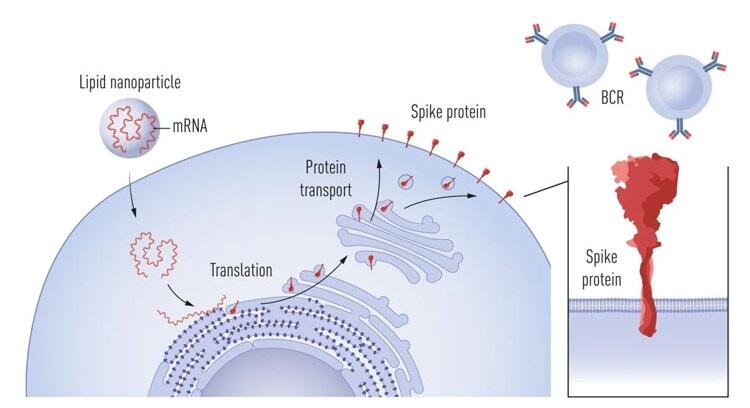
Provided by the Nobel Foundation
Entering the human body through a 'replacement method' without being recognized as a foreign substance
Using mRNA to create vaccines has been around since 1990. However, mRNA is easily degraded and is often considered a foreign substance by the body, leading to strong reactions like inflammation. This made its practical application difficult.
According to organizations such as the Nobel Foundation, Karikó and Weissman, who were researchers at the University of Pennsylvania, began their comprehensive research in 1997 to solve the problems associated with the development of mRNA vaccines. They discovered that replacing uridine (a common mRNA component) with pseudouridine (a molecule commonly present in transfer RNA [tRNA]) prevents the mRNA from being recognized as a foreign substance in the human body. The paper on this 'replacement method' was published in 2005. The two researchers repeated countless experiments before making this discovery.
As explained by a representative from the Karolinska Institutet at the press conference, "Dr. Karikó, who is knowledgeable on mRNA, and Dr. Weissman, who has a deep knowledge of immunology, advanced their research by complementing each other's expertise."
What background did Dr. Karikó and Dr. Weissman each have, and how did they eventually meet and come to share the same fate of achieving research results that would save many people worldwide? Looking at their backgrounds again, Karikó was born in Hungary on January 17, 1955, received her PhD from the University of Szeged in Hungary in 1982, and moved to the USA in 1985 after working at the Hungarian Academy of Sciences. She served as a postdoctoral fellow at Temple University in the USA and as a senior research fellow at the University of Pennsylvania before joining BioNTech in 2013. She has concurrently served as a professor at the University of Szeged and a visiting professor at the University of Pennsylvania since 2021.
Weissman was born in the USA on September 7, 1959, graduated from Brandeis University in 1981, received his PhD in Immunology and Microbiology from Boston University in 1987, and served as an associate professor at Perelman School of Medicine at the University of Pennsylvania before becoming a professor in 2013.
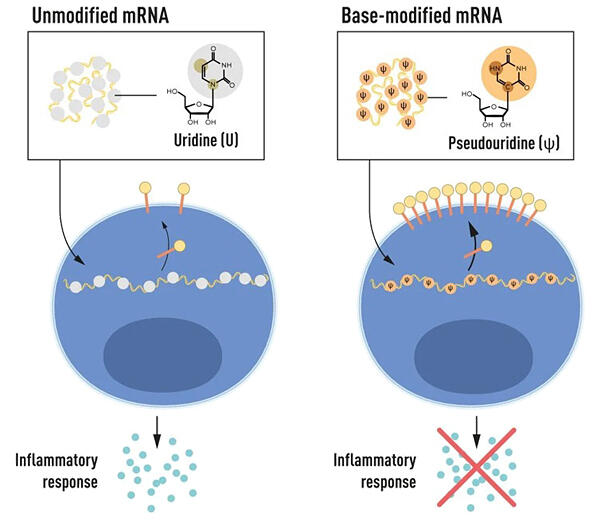
Provided by the Nobel Foundation
Karikó, whose research was terminated in her home country, also faced hardship in the USA
Karikó was awarded the Keio Medical Science Prize in 2021 and the Japan Prize in 2022. She held an online lecture at the 'Science Agora 2021' conference organized by the Japan Science and Technology Agency (JST) in November 2021. She visited Japan many times for award ceremonies and lectures. In her lectures and media interviews, she looked back on her research career and shared stories regarding the difficulties and hardships she experienced before achieving success in mRNA vaccine research.
According to Karikó and documents published about her, she was born in Szolnok, a rural city in Eastern Hungary. The city was devastated by air raids during World War II. However, the city was being rebuilt by the time she was born and growing up. Nonetheless, life was not easy, as supplies were scarce during the Cold War, and there was no running water or television. However, she described her days with her parents (who ran a butcher shop) and her younger sister as "happy." As a teenager, she enthusiastically studied biology with her parents' encouragement. "I was a curious child. At the age of 16, I decided to become a scientist," she mentioned in her acceptance speech for the Keio Medical Science Prize. She then enrolled at the University of Szeged, a university with a long tradition and outstanding achievements, to study molecular biology in depth.
She received her PhD from the same university and continued her research at the Hungarian Academy of Sciences. However, in 1985, when she was 30 years old, her research funding was terminated. She searched for research opportunities in European countries and found no institutions willing to accept her. When she found that only Temple University would accept her, she decided to move to the USA with her husband, who was an engineer, and their eldest daughter, who was 2 years old at the time. With only an estimated 200,000-yen equivalent in cash, she made a "determined journey to the USA" without considering returning to her homeland.
Taking foreign currency out of Hungary was prohibited at the time. As the story goes, she concealed the cash in her daughter's stuffed teddy bear to bring to her new home. Her eldest daughter became a rower in the USA. She won two consecutive gold medals as a US national rowing team member at the Olympic Games in London in 2008 and in Beijing in 2012.
Karikó then moved to the University of Pennsylvania in 1989, where she met Weissman, who was working on an AIDS vaccine. Although she began in-depth research on the medical applications of mRNA, research on fragile mRNA did not gain widespread understanding. She experienced a difficult time when her grant funding was terminated. Nevertheless, she continued her research. However, even after she published a paper on mRNA vaccines in 2005, it initially did not garner much attention. Her research career was never smooth sailing.
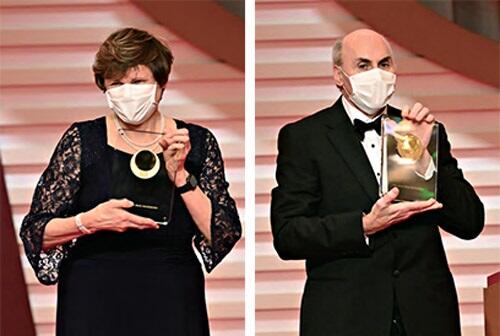
Provided by the Japan Prize Foundation
Interacting with Japanese researchers, and discoveries made by the late Dr. Yasuhiro Furuichi contribute to Karikó's research.
Dr. Karikó repeatedly mentioned Dr. Yasuhiro Furuichi in her lectures. Furuichi was a Japanese molecular biologist who passed away in October 2022 at the age of 81. Furuichi graduated from the School of Pharmacy and Pharmaceutical Sciences at the University of Toyama and received his PhD from the Graduate School of the University of Tokyo. He continued his research on mRNA at the National Institute of Genetics, where he discovered the 'cap' structure at the tip of RNA in the mid-1970s. The structure was named after its cap-resembling shape.
RNA will not function correctly without this structure. Compared with DNA studies, RNA research, especially mRNA research, has been less spectacular. However, mRNA cannot function without the cap structure, and proteins cannot be produced. For this reason, Furuichi's work is considered crucial and is said to have led to the practical application of mRNA vaccines. Unfortunately, Furuichi passed away last year without hearing the news of the Nobel Prize awarded to Karikó. However, he must have been pleased to see the worldwide dissemination of antiviral mRNA vaccines during the COVID-19 pandemic.
Because of their similar research fields, Karikó had interactions with Professor Keiji Itaka, who conducts research on biofunctional restoration at Tokyo Medical and Dental University, and Professor Ken J Ishii, who specializes in immunology at the Institute of Medical Science at the University of Tokyo and is responsible for reviewing Karikó's papers. Osaka University posted a message on its website, stating, "Dr. Karikó has deep connections with researchers at our university, and we at Osaka University, which has strongly promoted this research field for many years, sincerely congratulate both of the two scientists on this honor."
Furthermore, Director Emeritus/Professor Shinya Yamanaka of the Center for iPS Cell Research and Application at Kyoto University posted the following message on the Center's X (formerly Twitter) account: "Congratulations on your award. I was deeply impressed after hearing that you have been persistent in your research when I had the opportunity to have a conversation with you. Your groundbreaking invention of the mRNA vaccine technology has saved many people."
Many of her close Japanese acquaintances have expressed their congratulations, and the common impressions they share are her "friendly personality" and "persistence in diligently pursuing comprehensive research."
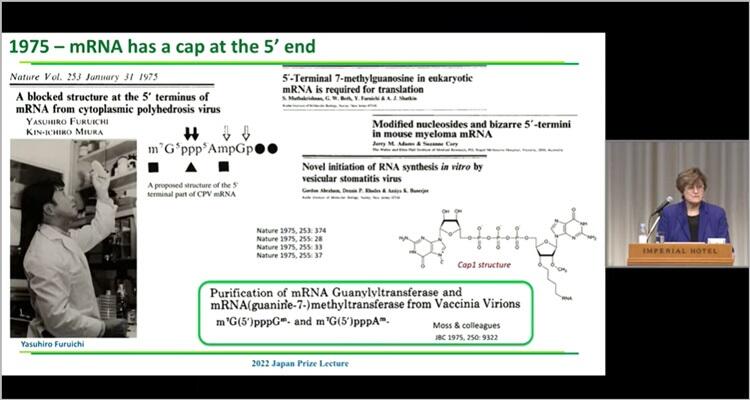
Provided by the Japan Prize Foundation
A meeting in line for the photocopier leads to discussion on 'research barriers'
After being selected for the Nobel Prize in Physiology or Medicine 2023, Karikó told the Nobel Foundation in a telephone interview, "At first, I thought someone was making a joke." When it became clear that it was not a mistake, she and Weissman attended a press conference at the University of Pennsylvania.
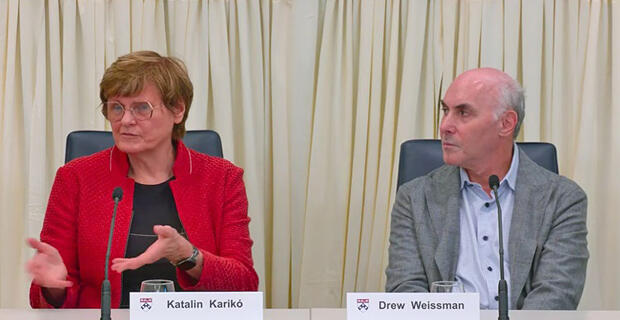
Provided by the University of Pennsylvania
At a press conference, Karikó happily recounted how she met Weissman while waiting in line for a photocopier in 1997. At that time, there were few photocopiers, and the waiting time became a great opportunity to exchange information. In their research, both researchers faced a wall. "It was nice to talk about various ideas," she said. "Although our laboratories were in different buildings, it was fun to start working together."
Weissman stated, "(When I met Dr. Karikó,) I could not get research funding, and nobody was interested in my research. Clinical trials continued to fail. However, I met her, and we worked together for the next 20 years. We never gave up and persevered in our research patiently."
When asked by the moderator for her advice to female students, researchers, and others following in her footsteps, Karikó replied, "If you want to be in the spotlight, become an actress. If you want to follow orders, the military would be a good choice. However, if you enjoy solving problems, science is for you."
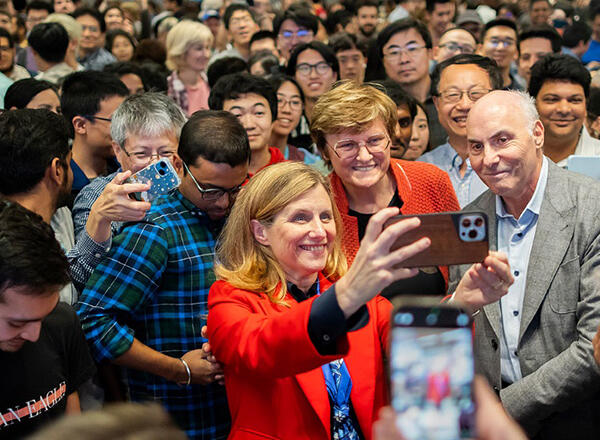
Provided by the University of Pennsylvania
High expectations for application of vaccines to various infectious diseases and cancer treatments
At a press conference for the Japan Prize laureates, Karikó mentioned their mRNA research, stating, "We did not originally intend to create a vaccine. Instead, we continued our research, intending to use it for pharmaceuticals. The research to develop a COVID-19 vaccine stemmed from an ethical obligation (to save those infected)."
As a result, it protected many people worldwide from COVID-19 infection or from the disease becoming more severe. The Director-General of the World Health Organization (WHO), Dr. Tedros Adhanom Ghebreyesus, stated that the technology developed by Karikó and her colleagues "played a crucial role in controlling the pandemic." There is a high expectation that the technology they develop will have broad applications.
The Karolinska Institutet expects the technology to be applied to vaccines for malaria, influenza, and other infectious diseases, and cancer treatment. In her lecture explaining the research findings, Karikó presented research on vaccines that stimulate the immune system to attack cancer cells.
The institute also highly praised the achievements of the two scientists. However, at the press conference, questions were raised on the safety of mRNA vaccines. In response, a representative of the institute expressed an opinion, stating, "13 billion people have already been vaccinated, and adverse reactions have been limited, and we do not consider them a significant concern. Actual infection with the novel coronavirus may have a higher risk of long-term health effects." The representative further noted, "We need to continue to explain how the mRNA vaccine works (in the body)."
The Nobel Foundation is known for not awarding any prize in the field of science to research findings that still have safety or ethical concerns. The decision to award a Nobel Prize at this time to the researchers behind the technology of the COVID-19 mRNA vaccines is a recognition of their safety. However, it means taking on the responsibility of awarding the Prize.
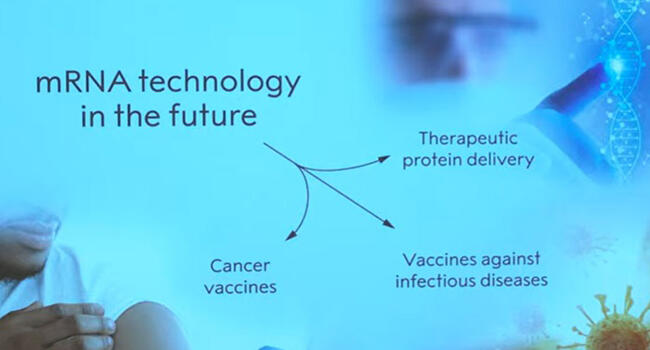
Provided by the Nobel Foundation
(UCHIJO Yoshitaka / Science Journalist, Kyodo News Visiting Editorial Writer)
Original article was provided by the Science Portal and has been translated by Science Japan.




